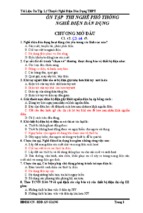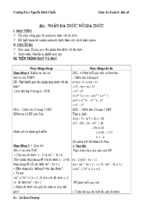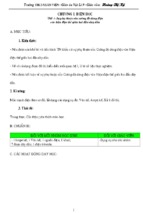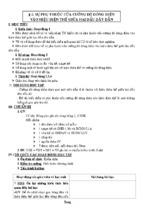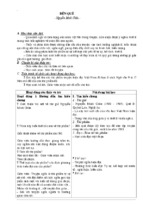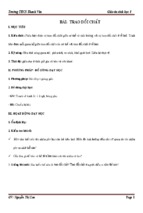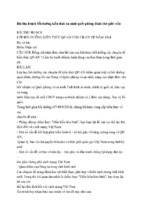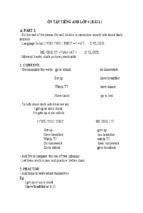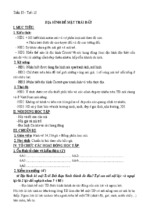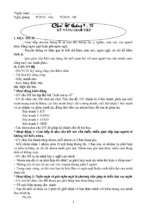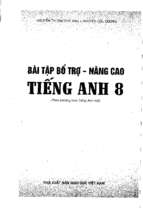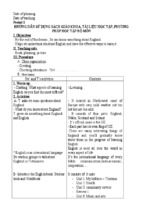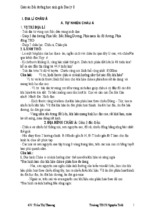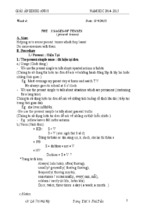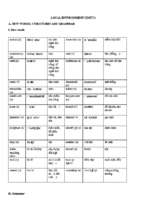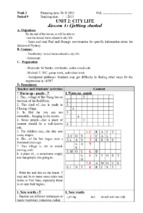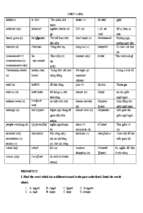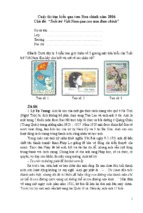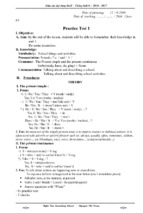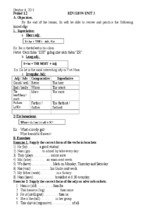Week: 16th
Period: 47th
UNIT 8
COUNTRY LIFE AND CITY LIFE
Lesson 1
GETTING STARTED & LISTEN AND READ
I. Objectives:
1. Educational aim: students get acquainted with the topic “Country Life And City Life”.
2. Teaching aim: By the end of the lesson , students will be able to talk about the city life the
country life.
II. Language contents:
1. Vocabulary: beautiful views, fresh food , traffic jam, relative, peaceful, permanently, remote,
medical, accessible, definitely, change for the better.
2. Grammar: - Present progressive.
- Comparative and superlative adjective.
III. Techniques: Eliciting, True / False
IV. Teaching aids : pictures, cassette, sub board.
V. Procedures:
Teacher’s activities
1. Warm –up
-Asking some questions.
a. Where do you live?
b. Do you want to live in the country? Why?
c. Do you want to live in the city? Why?
2. Pre-reading
-Teach the new words.
beautiful views (n): cảnh đẹp
fresh food (n): thức ăn tươi
traffic jam(n): tắt nghẽn giao thông
relative(n): hoï haøng
peaceful(adj): yeân bình, thanh bình
permanently(adv):laâu daøi, maõi maõi
remote(v): xa xoâi, heûo laùnh
medical facilities (adj): cô sôû vaät chaát cho y teá.
accessible (adj): (coù theå) tieáp caän ñöôïc
definitely(adv): xaùc ñònh, ñònh roõ
change for the better: thay ñoåi theo chieàu höôùng toát
hôn
- Ss how to read the words in the text.
3. While -reading:
- Play the tape.
Ask them to read the dialogue again.
Students’ activities
-Answer.
-Guess the meaning.
-Copy the new words.
-Role-play.
-Read and check.
-Work in pairs.
101
Answer the questions.
a) Where has Na been?
Na has been to Kim Lien Village.
b) How long was she there?
She was there for the weekend.
c) What is her opinion of the countryside?
To her, the countryside is peaceful and quiet and
there is nothing to do.
d) Na said, “There is nothing to do”, what does she
mean by this?
There is no libraries, no movies, no supermarkets,
no zoo…
e) What are some of the change that Hoa mentions?
Country is becoming better. Many remote area are
getting electricity. People can now have things like
refrigerators and TV medical facilities are more
accessible.
4. Post -reading
-divide the class into 4 groups. Two groups include
students who prefer the city life and the others
include students who prefer the country life.
-ask them to work in groups to answer the
questions.
Do you prefer the city or the country life? Why?
-ask them to report.
5. Homework:
-Write 5 sentences about your country life or city
life .
-Do exercises in Workbook.
-Prepare the part: Speak and listen
- Answer the questions.
a. Na has been to Kim Lien Village.
b. She was there for the weekend.
c. To her, the countryside is peaceful
and quiet and there is nothing to do.
d. There is no libraries, no movies, no
supermarkets, no zoo…
e. Country is becoming better. Many
remote area are getting electricity.
People can now have things like
refrigerators and TV medical facilities
are more accessible.
-work in groups.
-report.
VI. Comments
.............................................................................................................................................................
.............................................................................................................................................................
.............................................................................................................................................................
_______________________
102
Week: 16th
Period: 48th
UNIT 8
COUNTRY LIFE AND CITY LIFE
Lesson 2
SPEAK + LISTEN
I. Objectives:
1. Educational aims: Students know the difference about the city life and the country life.
2. Teaching aim : By the end of the lesson, students will be able to practice speaking about the
changes of a place
II. Language contents:
1. Vocabulary:
2. Grammar: - Present progressive/ - Comparative and superlative adjective.
III. Techniques: Brainstorming, eliciting.
IV Teaching aids: picture, cassette.
V. Procedures:
Teacher’s activites
1. Warm-up
-Have the students answer some questions
* Have you ever been in the city?
* Do you prefer the city or the country?
2. Pre-speaking
Look at the pictures then comparative the city and
the country. The words in the box under the pictures
may help the students.
- Write the words prompts on the board so that can
speak easily.
Traffic
busy
Sky
cloudy
Houses
high
City
beautiful
Trees
green
3. While -speaking
- Get them to work in pairs.
- Monitor and help students speak.
- Have students practice in groups or individual
- Check the mistakes and correct the answers.
* Possible answer.
- The town is becoming busier and noisier.
- The traffic is becoming busy.
- The buildings are becoming taller, more beautiful
and modern.
- The streets are getting dirty.
- Things are getting more expensive.
Student’ activites
Answer.
-Work in groups
-Individuals
-Work in pairs.
-work in pairs.
- Talk about the change in your
103
hometown.
4. Post – Speaking:
- Ask students to talk about the change in your
- Listen and fill
hometown.
- Set the scene: “Aunt Hang is talking to Lan on the
-do the exercises.
phone. She is coming to visit Lan in Hanoi”.
- Ask them to listen to the tape and complete the
dialogue on page 74.
- Let them listen twice and find out the missing
words.
- Ask them to share their answer with their partners.
- Call some students to read.
- Write homework.
1. that
2. this 3. It’s 4. Where 5. From
6. coming 7. next week 8. arriving 9. Thursday
10. late afternoon 11. get
LISTENING
1. Pre-listening
-Listen to the teacher
- Introduces the content of the dialogue
-Guess and complete the dialogue
-Asks sts to to read the dialogue carefully,then
guess and complete the dialogue
-Listen and complete
2. While-listening
-Listen to the tape and complete the
-Plays the tape twice
dialogue
-Call some pairs of students to read the dialogue
3. Post-Listening
-Give the answer key:
-Check their result them selves
1. that
2. this
3. It’s
4. Where
5. from
6. coming 7. week
8. arriving
9. Thursday 10. late
11. afternoon 12. speak
13. my
14. get
5. Homework:
Do exercises in Workbook
Prepare: Unit 8 ( READ )
*The content of listening
Lan: Hello
Aunt Hang: Hello, Is that Lan
Lan: Yes. Who is this?
Aunt Hang:It’s Aunt Hang. How are you?
Lan: I’m fine. Where are you phoning from?
Aunt Hang:Hue.I’m calling to tell you your Uncle Chi and I are coming to visit you next week
Lan:Great! When are you arriving?
Aunt Hang:On Thursday. We’re arriving in Ha Noi in the late afternoon
Lan: Ok, Do you want to speak to my Mom?
Aunt Hang: Yes, please
Lan: Hold on a moment and I’ll get her
104
Week: 17th
Period: 49th
UNIT 8
COUNTRY LIFE AND CITY LIFE
Lesson 3
READ
I. Objectives :
-By the end of the lesson, students should know more about the country life and the city life.
-Reading comprehension about the problem of people from the countryside moving to the city.
-By the end of the lesson, students will be able to understand the text about one of the social
problem .
II/ Language contents:
1. Vocabulary:
rural, urban, well-paying, struggle, typhoon, flood, drought, destroy, increase, put a strain on,
supply, tragedy
2. Grammar: (review)
III/ Techniques:
Skimming, scanning.
Question and answer.
True or false, brainstorming, multiple choice.
IV/ Teaching aids: Picture, textbook.
V. Procedures:
Teacher’s activities
1. Warm up:
*Jumbled words:
-Write the words with disordered letters on the board:
-fulenlpti - poontipula - tanaru – viroedp – suertl
- lfdoo - roestdy
2. Pre-Reading :
-Introduce the country life and the city life
-Have student read silently the text and find the new
words.
+ Explain some new words.
- rural, urban, traditional, well paying, struggle,
typhoon, flood, drought, destroy, increase,
overcrowding, live apart,
3. While-Reading:
*Gap-fling:
-Have Students read the text again then fill in the
blanks for the exercise 1/p75.
Check and correct the answer.
-Get feedback.
*Answer key:
Students’ activities
-Play the game
-Go to the board and write the correct
words
-plentiful – population – naturalprovide – result – flood - destroy
-Read silently.
-Give out the new words.
Read the text again and notice how to
pronunciation new words.
-Read the text again then fill in the
blanks for the exercise 1/p75.
-Work in pairs.
-Give the answer.
105
1. leaving
2. home
3. city
4. rural
5. rural
6. problems 7. schools 8. hospital
9. problem 10. world
*Finding the words:
-Have students read the text again then fill in the
blanks for the exercise 1/p75.
- Have students write the answers on their mini board.
-Get feedback
a. of the country
b. as many as needed
c. become greater or larger d. a great pressure
e. a terrible event
f. of the city or city life
4. Post-Reading:
*discussion
-Giving situation: If you were a Minister, what would
you do for farmers?
-Ask students work in groups and possible answers:
+Build streets, theaters, stadium in the country
+Build schools, hospital
+Provide clean, electricity, facilities
+Build factory
5 .Homework :
-Rewrite the answer
-Do exercises : (Workbook)
-Lean new words by heart.
-prepare the next lesson. (Writing)
Read the text again then fill in the
blanks for the exercise 1/p75.
- Write the answers on their mini board.
-Give the answer
a. rural
b. plentiful
c. increase
d. strain
d. tragedy
f. urban
-Work in groups.
- -write homework.
VI. Comment........................................................................................................................................
................................................................................................................................................................
................................................................................................................................................................
................................................................................................................................................................
................................................................................................................................................................
................................................................................................................................................................
_______________________
106
Week: 17th
Period: 50th
COUNTRY LIFE AND CITY LIFE
UNIT 8
Lesson 4
WRITE
I. Objectives:
-Writing letters to friends about the neighborhood.
-By the end of the lesson, students will be able to write letters to their friends.
II/ Language contents:
1/ Vocabulary: Ss’ background knowledge.
2/ Structures: the present simple tense.
III/ Techniques: Questions and answers, group work, cross check.
IV/ Teaching aids: Textbook.
V. Procedures:
Teacher’s activities
1. Warm up :
- Ask them to put the out line for an informal
letter in the correct order
-Prepare 6 cards with 6 out line on them
-Call six students to rearrange them in the
correct order.
-Write the answer on the board so that Ss can
answer the outline of the letter.
*a formal letter:
1. Heading:
-Writer’s address.
- Date
2. Opening :
-Dear
3. Body of the letter:
4. Closing:
2. Pre-Writing:
Ask Ss some questions
-“Do you often write a letter to your friend? Or
Did you receive a letter you’re your fiend?”
-Ask Ss to work in pairs to answer the questions
in exercise 2 (page 76)
Give feedback
a. Where do you live?
b. What does your house look like?
c. What can you see from your bedroom
window?
Students’ activities
- Whole class.
-Look at the card and choose the suitable
outlines.
- Take note the outline on the books and try
to remember.
-Answers
- Work in pairs .
a. I live in a small town /big house /village .
b. My house looks very nice/small with 4/5
rooms
c. From my bedroom window, I can see a
107
d. How far is it from your house to school ?
e. What kind of facilities are there in your
neighborhood?
f. What thing in your neighborhood do you
like best ? Why?
-Check and correct.
3 .While-Writing:
-Introduce the context .
-Ask Ss to write letter to friend about their
neighborhood.
-Let them write individually
-Ask ss to compare with their partners and
correct if they can.
4. Post-Writing:
-Choose some letters to correct before class.
Model letter
Dear Lan!
Thanks for your letter. I’m pleased to tell
you about my new house. Now I live in a small
house on Dong Khoi street. It’s small but really
beautiful. From my bedroom window, I can see a
green rice paddy and a river. It’s not very far
from my home to my school, about 1 km. So I
walk to school everyday. In my neighborhood,
there is a stadium, which I like best because I
can go there to play soccer.
I hope you can come to my place some day.
Love
Hai Thuy
small park with many green trees and colorful
flowers.
d. It’s very near so I can walk to school .
e. There is a hospital, a post office, two
schools a market ……...
f. I like ……….best .Because……….
- Share and compare with other group
-Read
- Write letter to friend about their
neighborhood
-Write (Individual)
- Compare with their partners and correct
(self-correct / teacher corrects)
- Read the letter.
-Get feedback / Correct mistakes
-Write homework.
5. Homework:
-Do exercise inwork book.
-Prepare the next lesson.
VI. Comments .........................................................................................................................................
...................................................................................................................................................................
...................................................................................................................................................................
_______________________
108
Week: 17th
Period: 51th
COUNTRY LIFE AND CITY LIFE
UNIT 8
Lesson 5
I. Objectives:
- Talk about the future events.
-
LANGUAGE FOCUS
Talk about the differences.
II. Language contents:
-
Grammar: The present progressive.
Comparative and superlative adjectives.
-
Vocabulary: Long adjectives and short adjectives
III. Techniques: Speaking, Writing, Completing.
IV. Teaching aids: Pictures, Books, Real objects.
V. Procedures:
Teacher’s activities
1.2. Language focus 1
Ask them to do the exercise 1 on page 77.
- Call on some students to practice the dialogue.
- Give them the shipping information and ask
them to make similar dialogues.
Example:
S1: is the boat to Quy Nhon leaving at 11.30?
S2: Is that good fortune?
S1: That’s right.
S2: I’m very sorry. It’s been delayed.
S1: Oh no
S2: Now, it’s leaving at 13.35.
Example 2.
S1:s the boat from Canada arriving at 11.00?
S2: Are you talking about Diamond Eyes?
S1: Yes.
S2: it’s arriving on time.
2. Language focus 2
- Ask them to use the suitable verbs the present
progressive tense to complete the dialogue in
exercise 2 page 78.
-get some pairs to practice the dialogues before
the class and correct.
Students’ activities
- Practice with a partner.
S1: The boat from Canada arriving at 11.00?
S2: Are you talking about Diamond Eyes?
S1: Yes.
S2: it’s arriving on time.
- Give the answer:
a. am playing
b. are doing
a. am watching
d. am going
e. are cleaning
f. am having
109
* Answer
a. am playing
b. are doing
a. am watching
d. am going
e. are cleaning
f. am having
3. Language focus 3
- Give the form: Be + V- ing
Use: describe changes with “get” and
“become”
- Ask them to do the exercises.
- Give the answer.
a. The boys are getting tall.
b. The old men are becoming weak.
c. It is getting dark.
d. The weather is getting cold.
e. The students are getting better.
f. The schoolyard is becoming cleaner.
4. Language focus 4.5
Remind students of the form of comparative
and superlative
a. Comparative
-…short adjective-ER+than +……
-…more + Long Adjectives + than +………
b. Superlative
S + Be + The + Short Adjective – EST + ……
S + Be + The + Most - long Adjective + …
c. Irregular adjectives:
Good / well - better - the best
Bad
- worse - the worst
Many
- more - the most
Little
- less
- the least
c. Practice :
-Ask students to do exercise 4 on page 79
-They have to work in pairs to make the
different between the city and the country
about food ,traffic, transport, air, entertainment,
medical facilities, school, electricity with the
adjectives easy, expensive, cheap, good, bad,
poor, big,
accessible, fresh .
-Have students correct themselves.
- Give the answer.
a. The boys are getting tall.
b. The old men are becoming weak.
c. It is getting dark.
d. The weather is getting cold.
e. The students are getting better.
f. The schoolyard is becoming cleaner.
- Give structures
- Give examples
- Listen and write
- Do exercises 4
- Work in pairs
- Correct
110
-Then correct for them.
-Ask students to do exercise 5 on page 79
-Ask them to read the advertisement then ask
them some questions to check their
understanding.
5. Homework:
-do the exercises again
-Prepare the revision.
- Do exercise 5
THE TEN – MINUTE TEST
1. Write 5 sentences about the changes in your hometown.
2. Complete each of the following sentences in such a way that it has the same meaning as the sentences
printed before it (2.0pts) :
a. Ba is taller than Minh -> Minh is not …………………………………………………………………………………………………………….
b. She is more intelligent than her sister -> Her sister is not ……………………………………………………………………
c. Nobody in my class is better than Hoa-> Hoa is the………………………………………………………………………………….
d. My bad is different from yours ->Your bag is not as……………………………………………………………………………..
e. A dress is more expensive than a shirt -> A shirt is ………………………………………………………………………………
* KEY AND MARKS :
1. 5Marks : - (1 m / 1 s ) .
Students answer themselves
2. 5 Marks : - (1 m / 1 s ) .
a. Minh is not as tall as Ba .
b. Her sister is not as intelligent as her .
c.Hoa is the best student in my class .
d. Your bag is not the same as mine(my bad)
c. A shirt is cheaper than a dress .
Khoái Toång
Ñieåm >= 5
Ñieåm 8 - 10
Ñieåm 0 - 3
Ghi chuù
SL
%
SL
%
SL
%
lôùp
soá
22
8A2
23
8A3
V. Comments:.......................................................................................................................................
................................................................................................................................................................
................................................................................................................................................................
................................................................................................................................................................
................................................................................................................................................................
_______________________
111
Week: 17th
Period: 52nd
REVISION OF THE FIRST TERM
I .Objectives:
1 .Educational aims: By the end of the lesson, students should understand all words and
structures they have learnt.
2. Teaching aims:
II. Language contents:
1. Vocabulary: review.
2. Grammar: present progressive, simple present, present perfect…
III. Teaching aids:
IV .Techniques: picture description / True / False guessing, question-answer, multiple choice.
V. Procedures:
I. Summary of tenses
1. Simple present tense
I / We / You / They / + V + O
He / She / It … + V(s/es ) + O
2. Simple Past Tense
S + V ( simple past ) + O
3. Simple future Tense (Thì Töông Lai Ñôn):
S + Will + V + O
4. Present Perfect Tense:
S + Have / Has + Vpp + O
* Negative:
S + Have / Has + Not + Vpp + O
* Question:
Have / Has + S + Vpp + O?
5 . S + Be + (Not) + Adjective + Enough + To- infinitive
Eg : He is not old enough to go to cshool.
( He is not old .He can’t go to school) .
6.Talking about intentions with “going to”.
Eg : I am going to go to Da Lat next Sunday
7. Reflexive pronoun
Pronouns
proflexive
I
myself
112
You
yourself / yourselves
He
himself
She
herself
We
ourselves
They
themselves
8 .Used to : Ñaõ töøng (habit in the past : dieãn taû thoùi quen trong quaù khöù)
*.PREPOSITIONS OF TIME : GIÔÙI TÖØ CHÆ THÔØI GIAN
- On+ thöù / ngaøy /thaùng ngaøy.
- In + thaùng / naêm / muøa / buoåi .
- At night / … o’clock.
- For + 1 khoaûng thôøi gian (a year / a week / Two days / a long time ….)
- Since + 1 moác thôøi gian (1989 / last year / yesterday …)
- Between …… and……….
- Up to / until
. Choose the best answer:
1. They ‘ve studied……six o’clock .
a.in
b.at
c.since
d.for
2
My mother was ….last night, so we went out for dinner.
a. tired enough to cook
b .too tired to cook
c . tired for cooking
3 . ….have you lived in thisn town ? (a. how much / how many /how far / how long)
4. Airmail is ….expensive than surface mail . (a. the most / the same / as
5. It’s two years since I last ……Joe .
/ more)
(a. see / saw ./ have seen / seeing)
6. He went to school late because he stuck in the … …this morning .
a. rush hour
b. traffic light
c . traffic jam
d . cross road
7. Typhoons ,floods or droughts can easly ….,a harvest
a. destroy
b. finish
c. provide
8. Which one is …..,milk or orange juice ? (better
9. It …….in winter ; Now it ……….
b. rains / doesn’t rain
d. defeat
/ good
/ the best / well)
(a. is raining / doesn’t rain
c. rains / isn’t raining
d. is raining / isn’t raining
10. The climate is ………hotter and hotter .
113
a. coming
b. becoming
c. getting
d. b&c are correct
11. The party was great and we enjoy …..very much . (ourself / ourselves / usselves)
12. Our team won the game because we played very ……. … (well / goodly / better)
13. Her mother is the …….age as yours .
(similar / same / as / diffirent)
14. We spent a lot of time …… that work .
(to do / doing / do / does)
15. You ……..go to school late .
(must / must not / don’t have to / have to)
. Homework
-learn by heart structures.
-Prepare: Commands, request and advice in reported speech.
VI. Comments
.............................................................................................................................................................
.............................................................................................................................................................
.............................................................................................................................................................
_______________________
th
Week: 17
Teaching Day: 21/12/2012
REVISION OF THE FIRST TERM
I. Objectives:
By the end of the lesson, students should understand all words and structures they have learnt. .
II. Language contents:
1. Vocabulary: review
2 .Grammar
* Commands, request and advice in reported speech
*Comparative
III. Teaching aids:
IV. Techniques: True / False guessing, question-answer, multiple choice.
V. Procedures:
1 Commands, request and advice in reported speech.
(caâu töôøng thuaät)
a.Report Commands and requestudents: töôøng thuaät laïi caâu yeâu caàu vaø caâu meänh leänh
S + asked / told + me + to infinitive.
b. Report advices: töôøng thuaät laïi moät lôøi khuyeân .
S + said + S + should + V(infinitive).
2. Comparative . so saùnh .
a. Equative: so saùnh baèng
S + be (not) + as + Ajective + as ………
114
b. Comparative: so saùnh hôn
S + Be + Short Adjective – ER + Than + …..
S + Be + More -Long Adjective + Than + …..
c. Superlative: so saùnh nhaát
S + Be + The + Short Adjective – EST + Noun
S + Be + The + Most - Long Adjective + Noun
Short Ajective : tính töø ngaén (tt moät aâm tieát)
I/ Rewrite the following sentences:
1 Ba said to Khanh " Can you work harder, please ? "
Ba asked........................................................................................................................................................
2 My father said to me " You should live better"
My father said ...............................................................................................................................................
3 Minh said to his sister " Please buy me a newspaper"
Minh told........................................................................................................................................................
4 Jill is more intelligent than Bill. (as…..as)
Bill isn't..........................................................................................................................................................
5 Your hair is black. My hair is black, too. (the same)
Your hair color .....................................as...................................................................................................
6 The film was so boring, but I thought it was interesting. (different from)
The film was quite……………………..what............................................................................................................
7 He has worked for this company for ten years.
He started.......................................................................................................................................................
8 Lan last visited her mother 2 months ago.
Lan has not.....................................................................................................................................................
9 I went to the dentist's. I had a decaying tooth. (because)
I went .............................................................................................................................................................
10 It's dangerous to leave medicine around the house.
Leaving
IV. Homework
-learn by heart structures.
-Prepare: . FORM OF VERBS :( DAÏNG ÑOÄNG TÖØ )
V. Comments
.............................................................................................................................................................
.............................................................................................................................................................
.............................................................................................................................................................
_______________________
115
Week: 18th
Period: 54th
REVISION OF THE FIRST TERM
I. Objectives:
By the end of the lesson, students should understand all words and structures they have learnt.
II. Language contents:
1. Vocabulary: review
2 .Grammar : to – infinitives, bare – infinitives, gerund.
III. Teaching aids :
IV. Techniques: True / False guessing, question-answer, multiple choice.
V. Procedures:
Review all the structures from unit 1 to unit 8.
Acticity 1. FORM OF VERBS: (DAÏNG ÑOÄNG TÖØ)
Coù 3 daïng ÑT: Bare infinitive (V). To infinitive (To V). Gerund (V-ing )
1. Bare infinitive (V) .
Ñoäng töø nguyeân maãu ñöùng sau caùc ñoäng töø sau:
Modal Verbs / would rather / had better / let / make / feel / see / hear / notice/used to …+ V
2. To infinitive (To V).
Ñoäng töø nguyeân maãu coù to ñöùng sau caùc ñoäng töø sau:
-want / intend / decide / expect / hope / mean / offer / promise / refuse / wish / ask /
invite/ agree/ advise / start / try / remember / would like / stop / like …..+ To infinitive
- Be + Adjectives + To infinitive .
- Be + Adjectives + enough + To infinitive.
- Be + too + Adjectives + To infinitive .
3. Gerunds after some words :
Ñoäng töø gerund (V-ing ) ñöùng sau caùc ñoäng töø sau:
- like, love, dislike, hate , enjoy , avoid, stop , suggest, ask
+ V-ing
start , begin , try , mind, finish,tell
- Prepositions ( on / in / of / for/ of /at …….) + V(infinitive)
- Be + Adjective + to infinitive
- Be + Adjective + enough + to infinitive
- Be + too + adj + to infinitive
Activity 2. COMPARATIVE. SO SAÙNH .
Examples:
1, I like playing tennis.
2, They love reading novels .
3, Would you mind telling me the way to the post office ?
4, We should avoid drugs .
5, He enjoys listening to music.
6. My mother is interested in watching TV.
7. He is fond of traveling.
116
8. They refuse to go out.
9. We decided to go to Da lat.
10 . It ‘s very difficult to learn Chinese.
(underline the word or phrase that would bet complete the sentences)
1. He hasn’t been here (for / since / at ) Christmas.
2. The children shouldn’t (to play / play / playing) football in the street.
3. If you are not careful, you will cut (herself/ himself/ yourselves).
4. John is as (as tall as/ taller as / tall as) Tom.
5. We must be there (between / in / at) 9.30 and 10.30.
6. He enjoy (reading / to read / reads) picture books.
7. Mai is the (most intelligent / the most intelligent / intelligent ) girl in her class.
8. A car is (expensive / more expensive/ expensiver) than a motorbike.
9. Do you need any help ? ( Sure / No problem / Yes. That ‘s very kind of you)
10. My father has worked for his company (for / since / in) 20 years.
11. He plays (skillful / skillfully / skill)
12. (Scout / Scouting / Scouting) began in England in 1907.
13. The boys are (get / getting / gets) taller.
IV. Homework
-learn by heart structures.
V. Comments
.............................................................................................................................................................
.............................................................................................................................................................
.............................................................................................................................................................
_______________________
117
Week: 18th
Teaching Day: 23/12/2012
REVISION OF THE FIRST TERM
I. Objectives:
By the end of the lesson, students should understand all words and structures they have learnt. II.
Language contents:
1. Vocabulary: review.
2. Grammar: present progressive, simple present, present perfect…
III. Techniques:
picture description / True / False guessing, question-answer, multiple choice.
IV. Teaching aids: Textbook, chalk…
V. Procedures:
*Activity 1 Give the structures:
1. Present Simple tense. (Thì hieän taïi ñôn)
- Use: Ñeå dieãn taû caùc söï vieäc moät caùch toång quaùt, khoâng nhaát thieát chæ nghó ñeán hieän taïi. Ta
duøng thì naøy ñeå noùi ñeán mot söï vieäc naøo ñoù xaûy ra lieân tuïc ,laëp ñi laëp laïi nhieàu laàn, hay moât
ñieàu gì ñoù luoân luoân ñuùng, duø cho söï vieäc ñoù coù xaûy ra ngay taïi luùc noùi hay khoâng laø ñieàu khoâng
quan troïng.
- Form: + S + V/Vs / es + …………………….
Ex -The earth goes around the sun.
- S + don’t/doesn’t + V+ ………………..
-We don’t have classes on Sunday.
? Do/Does + S + V + ………………….?
- Does Lan speak French?
2. (not) adjective + enough + infinitive (khoâng) ñuû ……………….. ñeå
Ex: The water is hot enough for me to drink.
She isn’t old enough to be in my class
3. Near Future: Be going to ( thì töông lai gaàn )
- Form : S + is / am/ are + going to + Vinf
- Use : Duøng khi noùi veà moät vieäc maø ai ñoù quyeát ñònh seõ laøm hay döï ñònh seõ laøm trong töông lai.
Ex : There is a good film on TV tonight. I’m going to stay home to watch TV .
- Note : Be going to coøn duøng ñeå döï ñoaùn moät tình huoáng coù theå xaûy ra
Ex: I feel tired . I think I’m going to be sick.
4. Adverb of place (Traïng töø chæ nôi choán): out side, inside, there, here, upstairs,
downstairs ,next to, under ,…………..
Ex: The money was finally found under the boards.
5. Reflexive pronouns. (Ñaïi töø phaûn thaân): myself, yourself, himself, herself, itself, ourselves,
yourselves, themselves .
- Dieãn taû haønh ñoäng trôû laïi vôùi chính ngöôøi thöïc hieän .
+ Noù coù theå laøm tuùc töø (Object). Ex: Be careful.. You’ll cut yourself.
+ Noù ñöùng ngay sau töø maø noù laøm maïnh nghóa. Ex: An sent this letter itself.
- Ñaïi töø phaûn thaân laøm maïnh nghóa cho chuû töø. Noù ñöùng ngay sau chuû töø, hoaëc ñöùng ôû cuoái
meänh ñeà /caâu. Ex: Mary herself cleaned the floor.
6. Modal verbs
- Form : + S + modal verb + V + ……….
Ex : I can sing very well.
118
- S + modal verb + not + V + ………
Ex : Hoa may not come to the party tomorrow.
? Modal verb + S + V + ………….?
Ex : May I come in ?
- Modal verb : must, ought to, have to,should
* MUST: laø khieám trôï ñoäng töø (a modal) dieãn taû söï baét buoäc hay söï caàn thieát coù tính chuû quando caûm nghó cuûa ngöôøi noùi. (Ex: He must do this exercise again), hay dieãn taû tính qui taéc hay leà
luaät . (Ex: We must drive on the right)
* HAVE TO : dieãn taû söï baét buoäc hay söï caàn thieát coù tính khaùch quan – do yeáu toá beân ngoaøi.
Ex: Your eyes are weak. You have to wear glasses.
* OUGHT TO + V(base form) (neân): dieãn taû lôøi khuyeân. Ex: We ought to obey our parents.
* SHOULD: dieãn taû lôøi khuyeân. Ex: You should help the needed children.
* MAY / CAN / COULD: ñöôïc duøng ñeå dieãn taû lôøi yeâu caàu hay ñeà nghò.
- Yeâu caàu söï giuùp ñôõ: Can / Could + you + V + O / A, please ?(Ex: Can you help me,
please.)
- Ñeà nghò giuùp ai: May + I + V + O/A ?; Let + me + V + O/A. ; Do you need any help?
Shall + I + V + O / A ? Ex: May I help you?
* WILL: duøng ñeå dieãn taû lôøi yeâu caàu , ñeà nghò hoaëc lôøi höùa
- Will + you + V + O + A / M , please? Dieãn taû lôøi yeâu caàu.
Ex: Will you turn of the fan, please? I’m cold.
- I + will + V + O + A / M ? dieãn taû lôøi ñeà nghò laøm ñieàu gì cho ai .
Ex: The phone is ringing . I’ll answer for you.
- S + will + V + O + A / M ? dieãn taû lôøi höùa . Ex: I’m sory. This won’t happen again.
* Would / Do you + mind + . . . + ? dieãn taû lôøi yeâu caàu lòch söï .
- Would you mind + V-ing ( gerund) ? Ex:Would you mind telling me the result of the exam.
- Would / Do you mind if + I + V . . .? dieãn taû yeâu caàu ñöôïc laøm ñieàu gì
Ex: Would you mind if I opened the window? Do you mind if I open the window?
7. Questions with “WHY”: Duøng ñeå hoûi veà nguyeân nhaân hay lyù do
Why + do / aux. V + S + Vm +
O...?
Ex: Why do they cover the electric sockets?
Ñeå traû lôøi cho caâu hoûi vôùi WHY ta coù theå duøng :
- Meänh ñeà vôùi “because”. Ex: Why do you get up early? – Because I want to do exercise.
- Cuïm ñoäng töø nguyeân maãu. Ex: Why do you do exercise? – To keep healthy.
8. Past Simple Tense (Thì quaù khöù ñôn)
- Use: Dieãn taû haønh ñoäng xaûy ra vaø keát thuùc taïi moät thôøi ñieåm xaùc ñònh ôû quaù khöù
- Form: + S + V-ed(regular) / V2 ( column irregular) + ………… Ex : - He arrived here yesterday.
- S + didn’t + V + ………………….
- She didn’t go to school yesterday.
? Did + S + V + …………………… ?
- Did you clean this table?
- Note: Thì quaù khöù ñôn thöôøng ñöôïc duøng vôùi caùc cum töø chæ thôøi gian xaùc ñònh ôû quaù khöù : last
week / month / year . . ., a week / 3 days / 5 months . . . , yesterday, yesterday morning /
evening, In+ naêm, from 2000 to2005
- Caùch ñoïc caùc ñoâng töø ôû quaù khöù ñôn vôùi “ ED”:
+ “ ED”: ñöôïc ñoïc laø /t/ khi nhöõng ñoäng töø nguyeân maãu coù aâm taän cuøng laø /f/, /k/, /p/, /s/,/t/, //.
119
Ex : laughed , asked , helped , watch , pushed , dressed , ……………
+ “ ED”: ñöôcï ñoïc laø /id/ khi nhöõng ñoäng töø nguyeân maãu coù aâm taän cuøng laø /d/ vaø /t/
Ex : needed , wanted , waited , ……..
+ “ ED”: ñöôcï ñoïc laø /d/ khi nhöõng ñoäng töø nguyeân maãu coù aâm taän cuøng laø caùc aâm coøn laïi
Ex : enjoyed , saved , filled ,……….
9. Preposition of time (Giôùi töø chæ thôøi gian) : at, in ,on, from . . . to, for, by
- AT : + moät ñieåm thôøi gian cuï theå
Ex : We have class at one o’clock.
+ night
Ex : I sleep at night.
- IN : + thaùng/naêm cuï theå
Ex : I was born 1994
+ the morning/afternoon / evening
Ex : We have class in the morning.
- ON: + ngaøy trong tuaàn
Ex : We have class on Monday.
+ ngaøy thaùng naêm
Ex: I was born on April 6, 2006
- FROM + moät ñieåm thôøi gian + TO + moät ñieåm thôøi gian
Ex: We have class from 7.00 to 10.15
- FOR: + moät khoaûng thôøi gian : ñeå noùi raèng moät caùi gì ñoù dieãn ra bao laâu roài
Ex : We walked for 2 hours to reach the waterfall.
10. Used to + V(bare form): dieãn taû moät thoùi quen trong quaù khöù nay khoâng coøn
Ex: He used to play tennis.
* Note : Söï töông phaûn: USED TO + V(bare form) (Ñaõ töøng )
BE / GET + USED TO + NOUN PHRASE / GERUND (Quen)
Ex: Ba was born in a farmer family. He’s used to working in the sun.
120
- Xem thêm -

